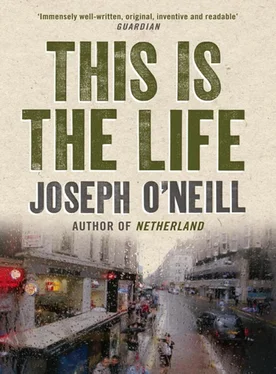Donovan had married Arabella Tetlow! The daughter of his former head of chambers! Surprised as I was, a potential hazard sprang immediately to my mind: it might be thought by the court that, given his ambition, Donovan had married Arabella to further his career.
Mr Donovan changed the subject. The pre-trial review, he said, was a golden opportunity that could not be missed. Michael and Arab would see each other for the first time since July. He wouldn’t be there — he knew when he wasn’t wanted so it was for me to engineer a meeting of some sort. I had to ring up her solicitors and start talks — serious talks, not just mickey mouse exchanges.
I sighed. ‘You must understand that there is little I can do. The matter is not in my hands. It is up to Michael and his wife to get together. I’m just a solicitor. I can’t snap my fingers and make things happen.’ I spoke tiredly but not irritably. ‘You must appreciate this.’
‘You can enable things to happen,’ Mr Donovan said urgently. ‘You can organize a framework.’
I gave a sad shake of the head.
‘Yes, you can!’ Mr Donovan was becoming excited. ‘You can! You plug away at your end and in the meantime I’ll work away at mine. I’ll get hold of Michael and talk some sense into him. Then I’ll get back to Arab. We may not be able to straighten this thing out, Jim, but we’ll give it our best shot. What do you say?’
He was being wholly unrealistic. No amount of agency, go-betweening and bridge-building would close the great, murky crack that divided his son and daughter-in-law. And there was something else he needed to be reminded of.
‘I’m afraid that I can’t do that,’ I said. ‘I take my instructions from Michael. I cannot involve myself in schemes behind his back. You know that, Mr Donovan. Another thing,’ I continued. ‘I must impress it upon you that Michael knows what he’s doing. You can rest assured that he has a stratagem which will address all of these problems.’
‘A stratagem? What are you talking about, stratagem?’ Mr Donovan spluttered. He lost his temper. He raised his voice. The time for games is over! We’re way past that stage! No more bullshit! Look where all his tricks and wangles have got him today!’
‘Please, Mr Donovan, calm yourself. Please.’
‘He’ll blow it!’ Mr Donovan exclaimed. ‘Mark my words he’ll blow it with his goddamn strategies!’
He must have seen the expression of scepticism on my face, because he expanded on his remarks in an urgent whisper. ‘Yes, that’s right, he’ll blow it. Jim, I’ve been around for a long time and, believe me, when it comes to blowing it I know what I’m talking about. If Michael blows it, Jim, that’s it. There won’t be any second chance. When it’s over it’s over. That’s a terrible thing to realize, Jim — that you’ve had your last chance and you’ve not taken it. I’m talking about remorse, Jim,’ Mr Donovan said. ‘Remorse.’
‘What do you suggest Michael does?’ I said.
‘He should come out on his hands and knees and beg for forgiveness!’ Mr Donovan whispered furiously, panting for breath. ‘He should cut down on his workload, devote himself to what matters — to what really matters. That’s what he should do, the idiot, instead of hatching his little plans.’ He stopped to breathe deeply. ‘He’s the one in the wrong — so it’s for him to set things straight.’
His outburst completed, Mr Donovan sat back tiredly in his chair. He acceded to my suggestion that we leave. I saw him to his hotel, and on the tube home I reflected that I disagreed deeply with him about the rights and wrongs of his son’s situation. Donovan, give up his work for Arabella? The idea was preposterous. On the contrary, it was Arabella who should be making the sacrifices. This was not for the crass reason that she was the wife and he the husband — no, this had nothing to do with sex or with emancipation or subjugation. We were not talking about an ordinary domestic situation here: the ordinary rules and norms did not apply. This is what Fergus Donovan and Arabella failed to realize. What made everything different here was that Donovan was a man of genius, of destiny. Allowances had to be made. History had to be accommodated in the household. Arabella should take a leaf out of the book of Mevrouw de Groot, Grotius’s wife. She stuck with her man through thick and thin — she even, if my memory served me correctly, went to prison with him when he was locked up with a life sentence. A man such as Donovan called for special devotion and loyalty. Unlike, say, a man like myself, an ordinary man with ordinary roles in life — shopper, friend, voter, propagator and taxpayer — Donovan’s gifts called him to lead an extraordinary and precious life. A woman could rightfully expect a man such as myself to provide her with the mundane benefits — children, money, love, diversion, time. But to expect these things, these niceties, from Donovan? Did these people not realize what a waste this would be? Imagine it! It was like asking Rembrandt to devote himself to the garden, or requiring a great scientist — Fleming, say — to put away his petri dish and concentrate on making his wife happy. Happiness? What was the happiness of one person compared to the advancement of humanity? Donovan was not in the personal happiness business. The rest of us, perhaps — let us be frank, what else are we good for? — but not Michael Donovan.
Let me qualify what I have just said before I give a misleading impression. As a solicitor, the rights and wrongs of a case are not my affair — indeed, I would be remiss if they were. It is not that in my professional capacity I must wash my hands of good and bad, but that, rather like a surgeon at the operating table, I must wear gloves. This suits me well, because I find it no easy matter to reach conclusions about ethics. The variables are generally so complex, the computations so intricate, that rarely do I have the wit or the heart to pursue them. Anyway, I find, you usually finish up by pointing the finger at both sides, so quite often the whole exercise does not advance things very far. But I think it would not be honest if I did not admit that, in this case, my hands were bare, and sticky with the virtues of those involved. I was on Donovan’s side.
One of the things preying on my mind in the time before the hearing of the pre-trial review was Susan. Her absence after our encounter was a relief at first, and then, as it persisted, disquieting. When over a week had passed without a word I decided, for my peace of mind, to contact her at work. I was worried that something might have happened. The problem was that when she answered the telephone it struck me that I had nothing to say — or no specific information to convey, at least.
‘I was just wondering how you were,’ I said.
‘I’m fine,’ she said flatly. ‘I’m also quite busy.’ She was eating something and making chewing noises as she spoke.
I hesitated. The occasion was more difficult than I had foreseen. ‘I see,’ I said finally. When she said nothing to this I added, ‘Well, all right then. I’ll see you around.’
‘I don’t think so,’ Susan said. ‘I don’t think we can take things very much further, do you?’
‘I … Well, you may be right.’
‘Goodbye, James.’
So that was that. Exactly what she was thinking I found hard to imagine, but I did understand her wish simply to put a stop to things. It was time to put us behind us once and for all. We had reached, as they say, the end of the road. Now some roads, like tributaries running into rivers, end by merging into other, larger roads, taking on their names and their bright destinations. My road with Susan, though, had not led anywhere special. It had just petered out.
Читать дальше
Конец ознакомительного отрывка
Купить книгу












